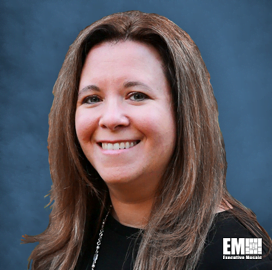
Kimberly Stambler
VP of Growth
LMI
Member Profile: Kimberly Stambler, VP of Growth for LMI
LMI’s Vice President of Growth, Kimberly Stambler, recently spoke with the Potomac Officers Club to share her strategy for driving success, recognize the colleagues who’ve helped guide her career and give advice for those pursuing roles in the government contracting industry. Stambler, who earned her Masters degree and PhD in crisis, emergency and disaster management from George Washington University, spent time with ManTech and Batelle prior to joining LMI.
What can you tell us about your background and how you’ve been able to adapt to the ever-changing challenges of the federal landscape over the course of your career?
“While my most recent roles in federal contracting have been focused on growth and capture, my technical background is in crisis, risk and emergency management. On the surface, these focus areas may seem worlds apart; however, the connection for me with respect to long range planning and managing with uncertainty and high stakes has become a valuable aspect of my approach to winning large contracts. My career progression has aligned well to the phrase ‘it’s a jungle gym and not a ladder’ — navigating the evolution of the federal landscape requires leaders to manage both the ‘wildfires’ happening right now and planning for what will be needed to keep growing in the future. My emergency management background, combined with focus in engineering and experience in federal contracting have all helped me adapt and evolve throughout my career so far.”
What do you believe are your core strengths as a leader and what lessons taught you the most about driving success?
“Some of my core strengths as a leader came naturally to me, and some I have worked on throughout my career and continue to hone on a daily basis. I put people first and strive to give everyone a seat at the table. This involves active listening and questioning to get others to think critically. I have become a much more versatile leader throughout my career and continue to work on that in terms of my communication style and how I support my team. Another core strength of mine is my ability to problem solve and think asymmetrically. I learn from every success and every failure and continually apply my own lessons learned to my approaches. Driving success is about giving people the opportunity to be challenged and learn from their experiences, while supporting them with guidance and resources along the way.”
Who are the executives that have inspired you the most over the course of your career?
“There are truly so many executives and leaders that have inspired me, supported me and helped me grow and learn throughout my career that it is hard to narrow it down to just a few. I would like to take this opportunity to publicly acknowledge a few people who mentored me (formally and informally) over the course of my career: Dolores Stafford, who gave me my first job right out of college, helping me navigate through the challenge of managing 70 volunteer college students and the associated ‘drama;’ My Doctoral advisor, Dr. Joseph Barbera who spent countless hours teaching me the principles of emergency management, critical thinking and decision making — I still remember so many of his stories; Lee Ann Schwope Cochran who had faith in me and selected me for a coveted business development rotational assignment, giving me tremendous opportunity to attend BD trainings, hone my BD skills and most notably, taught me the importance of professional network building; General Andy Twomey who put his neck on the line for me more than once, which inspired me to keep forging ahead; and lastly, I’d like to recognize Tim Shepley, who helped me learn the ‘art’ of business development and capture, and took the time to listen, guide, challenge and generously offer his counsel to me and many others in the field.”
How would you advise someone entering our industry to build their resume and advance their careers to be in the best position in the years to come?
“Our industry has many complexities and nuances, and it is important to spend time working in a variety of functional areas such as delivery focus, project/program management, business development and a ‘back office’ function such as finance. This both gives the individual the opportunity to try these different areas and eventually delve into the one they are most passionate about and makes them excel at whatever area they select because they will have an understanding of how these other functions work.”

Category: Executive Profiles




